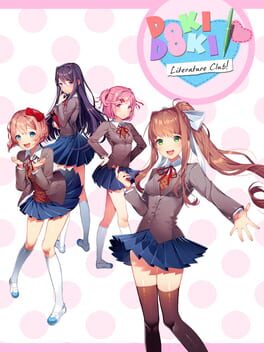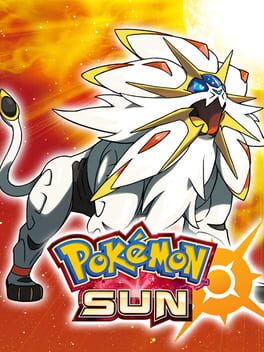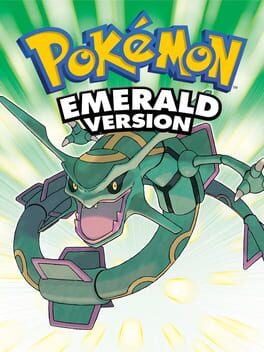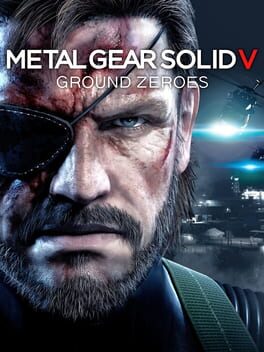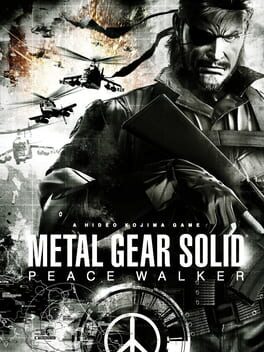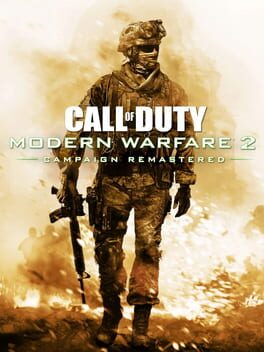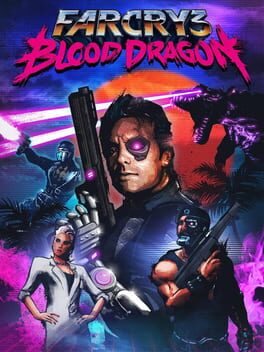ToxicYogurt
I think what stings about this the most is that it could easily be turned into something I adore. Anime isn't much my thing besides a select few series such as The Melancholy of Haruhi Suzumiya (which does everything this game does but actually has a point), and video games as a whole often squander their potential to be truly astounding creations to interact with. Merging these two under the guise of postmodern deconstruction is tricky but not impossible. I think this is achieved in the most routine way possible but is severely lacking in thought and purpose. It's not often that interacting with something and NOT interacting with something yields the exact same results. I don't much mind the gameplay being little more than a visual novel and I even love the idea of interacting with the game in multiple ways to achieve the "good ending", but the actual message at the end ruins my ability to suspend disbelief any further. Salvato states that he enjoys games that do something different and challenge the status quo, even if they are imperfect. While not inherently mean-spirited, I find this approach to creating anything to be entirely misguided.
This game is undeniably different. Minimizing the window and viewing the folder I downloaded of the game's contents and seeing how it changes throughout was very interesting. The constant fourth-wall breaking, character asides, and cleverly subversive use of repetition through dialogue and save states is also novel. These aspects end up being incredibly hollow by the end of the game. Nothing was done in service of characters, emotions, or themes beyond itself. This video game acknowledges it is a video game. Then what? It becomes a surface level examination of itself, serving itself and only itself. Some of the stuff with Sayori and Monika towards the end made me think that there was some form of empathy and depth provided to further connect with these characters, but they end up being little more than strands of code which is EXACTLY what the game wants to be. Madoka Magica posting painted over everything The Witness stands for. I think that this has the makings of actual art, but since people are just now starting to realize that games can and SHOULD be artistically realized, this should serve as an influence for people to create much more meaningful and thoughtful works in a similar vein as this.
You have reminded me that I cannot interact with the game in any meaningful way. The game is different from just about everything I've ever played. You have successfully made suicide, loud and dark digital distortion, and self harm upsetting. Congratulations. Now what?
This game is undeniably different. Minimizing the window and viewing the folder I downloaded of the game's contents and seeing how it changes throughout was very interesting. The constant fourth-wall breaking, character asides, and cleverly subversive use of repetition through dialogue and save states is also novel. These aspects end up being incredibly hollow by the end of the game. Nothing was done in service of characters, emotions, or themes beyond itself. This video game acknowledges it is a video game. Then what? It becomes a surface level examination of itself, serving itself and only itself. Some of the stuff with Sayori and Monika towards the end made me think that there was some form of empathy and depth provided to further connect with these characters, but they end up being little more than strands of code which is EXACTLY what the game wants to be. Madoka Magica posting painted over everything The Witness stands for. I think that this has the makings of actual art, but since people are just now starting to realize that games can and SHOULD be artistically realized, this should serve as an influence for people to create much more meaningful and thoughtful works in a similar vein as this.
You have reminded me that I cannot interact with the game in any meaningful way. The game is different from just about everything I've ever played. You have successfully made suicide, loud and dark digital distortion, and self harm upsetting. Congratulations. Now what?
Very very good. For lack of a better word, this game has a lot more soul in it than I expected. When I first attempted to play this game on my Xbox, I was immediately turned off by the high difficulty and sprawling Firelink hub. I ignored the fact that the enemies I fought in the prologue were leading me to the place I needed to go, and the ones I chose to face near the Catacombs kept respawning and dropping very few souls. Looking back on it, I can now recognize this as one of the many examples of Dark Soul's subtly powerful game design. Enemy placement, difficulty, and even some of the platforming sections undoubtedly exist to challenge, but they are not in the game for the sake of difficulty and beating the player down. This is further strengthened through the clever linearity of the many zones and their shortcuts, as well as intertwining with the game's core mechanics of trial and error as well as perseverance.
Giving humanity a desirable and useful physical form is goofy, but works incredibly well within the context of the world and gameplay. This allows for many comments on humanity and the human condition throughout this game, whether it be from slaying insane versions of characters once thought of to be great or saving several imperfect but well-meaning and determined characters such as Siegmeyer and Solaire. Even the less optimistic characters such as Patches and the Crestfallen Warrior have their own unique views on how to live life, often as a ways of dissuading defeat and nihilism. Some of these guys' questlines are shrouded in a mystery that I'm not sure I would've been able to crack on my own, but even still I enjoyed interacting with them any chance I got and didn't mind relying on help to assist them.
These two aspects, the clever game design and thematic exploration, turns this into one of the most uplifting games I've ever played. Of course the atmosphere is grim and the bosses are either tragic or grotesque, but the game doesn't feel the need to stomp these aspects into dust. A focus on exploration, personal betterment, and perseverance in the face of great difficulty is much more prevalent and refined than any of the negative aspects of this game. My favorite parts of this game have to be the online interactions between other players though. Seeing other people's phantoms running around and completing the same trials as you, leaving messages, and even showing you what NOT to do in the form of deaths feels comforting and uplifting in a world full of oppression. Backtracking through multiple areas in order to grind for some souls and advance the game and being serenaded with the victory bells of other players is not short of incredibly inspiring (and dare I say... strandlike?). A game truly full of despair and contempt for it's players would definitely not allow for so much heart and souls to be gained from this aspect if it did not wish to. I'm really glad the reputation this game has garnered in its 10 years of internet cult fame is more a surface level interpretation of difficulty more than anything else. Of course the game is difficult. You know this, I know this, the game knows this. But how difficulty is explored and treated as a surmountable achievement through the eyes of NPCs, bosses, and other players, this game is elevated to a status of true meaningful interaction with little filler and many aspects to admire and truly take a look at from another angle.
Besides a few uninspiring bosses, platforming sections, and a few glitches and moments of "...yeah OK game" this definitely stands among the finest video games ever made. I had an absolute blast playing this with two of my friends, and I look forward to eventually getting the platinum trophy in my subsequent NG+ runs.
I think it's also worth nothing that I accidentally closed this review without it saving multiple times, forcing me to restart, and the thing that killed me the most in the game was the wooden Blighttown elevator. Take this review with a grain of salt. Welcome to Dark Souls.
Giving humanity a desirable and useful physical form is goofy, but works incredibly well within the context of the world and gameplay. This allows for many comments on humanity and the human condition throughout this game, whether it be from slaying insane versions of characters once thought of to be great or saving several imperfect but well-meaning and determined characters such as Siegmeyer and Solaire. Even the less optimistic characters such as Patches and the Crestfallen Warrior have their own unique views on how to live life, often as a ways of dissuading defeat and nihilism. Some of these guys' questlines are shrouded in a mystery that I'm not sure I would've been able to crack on my own, but even still I enjoyed interacting with them any chance I got and didn't mind relying on help to assist them.
These two aspects, the clever game design and thematic exploration, turns this into one of the most uplifting games I've ever played. Of course the atmosphere is grim and the bosses are either tragic or grotesque, but the game doesn't feel the need to stomp these aspects into dust. A focus on exploration, personal betterment, and perseverance in the face of great difficulty is much more prevalent and refined than any of the negative aspects of this game. My favorite parts of this game have to be the online interactions between other players though. Seeing other people's phantoms running around and completing the same trials as you, leaving messages, and even showing you what NOT to do in the form of deaths feels comforting and uplifting in a world full of oppression. Backtracking through multiple areas in order to grind for some souls and advance the game and being serenaded with the victory bells of other players is not short of incredibly inspiring (and dare I say... strandlike?). A game truly full of despair and contempt for it's players would definitely not allow for so much heart and souls to be gained from this aspect if it did not wish to. I'm really glad the reputation this game has garnered in its 10 years of internet cult fame is more a surface level interpretation of difficulty more than anything else. Of course the game is difficult. You know this, I know this, the game knows this. But how difficulty is explored and treated as a surmountable achievement through the eyes of NPCs, bosses, and other players, this game is elevated to a status of true meaningful interaction with little filler and many aspects to admire and truly take a look at from another angle.
Besides a few uninspiring bosses, platforming sections, and a few glitches and moments of "...yeah OK game" this definitely stands among the finest video games ever made. I had an absolute blast playing this with two of my friends, and I look forward to eventually getting the platinum trophy in my subsequent NG+ runs.
I think it's also worth nothing that I accidentally closed this review without it saving multiple times, forcing me to restart, and the thing that killed me the most in the game was the wooden Blighttown elevator. Take this review with a grain of salt. Welcome to Dark Souls.
2015
I don't think I inherently enjoy Souls-type games. High levels of difficulty are not something I actively search for when deciding which games to play, and of course these types of games wear their difficulty on their sleeves. I definitely don't think that these games hold disdain for the player or itself, but simply existing in a difficult state with stylized creature designs and environments is not enough for me to latch onto and really care about what I am doing. The story to this game is something that takes a backseat to exploration and trial and error fighting styles, allowing the player to progress through the sprawling yet linear game at their own pace and in their own style. The game doesn't quite live up to even this meager consistency either since it is a game meant to be played fast and aggressively due to the HP system and lack of any real armor or protection from shields. A step away from the occasional sluggishness from the actual Souls games was definitely welcomed with open arms by those who cannot get enough of them, but I like to think that my play style is more methodical than the game would like to allow.
But I digress, even if these issues were resolved I still think there is a true lack of inspiration in what you do. The atmosphere of the game is what sells it to most, and the combat is the cherry on top. I could never get ahold of the atmosphere in a way where I could wield it in a helpful or hopeful way. The few NPCs scattered throughout the game are often faceless people behind doors which you see in passing when warping in and out of a central location. They don't provide much to be fighting for and lack personality to the point where even when I saw them physically, they still felt faceless. I played a lot of this game with a friend who really loves it and talked to other friends who also greatly enjoyed this, and their many opinions seemed to all stem from the fact that YOU the player were an agent of hope amidst a sea of bleakness. This is something I could get behind if I felt as though anything I did was ever for a good reason. The first boss you fight is a man pushed to his wit's end who kills his wife and it is your duty to not only put him out of his misery, but to inform his daughters of their parent's demise which effectively kills them. This is one of the only real NPC interactions you have, and it is steeped in a great amount of misery and chaos. The entire game feels just as unrelentingly bleak and oddly self-serious, never using the fact that it is a video game to do anything besides challenge the player on a gameplay level. I just wish these challenges were linked to thematic material in a way that didn't constantly beat you down and seemingly punish you for doing what you think is right.
The cyclical and dream-like nature of the overarching plot even denies you of any real closure in the three endings it provides, rendering all that you do a footnote in the grand scheme of "getting good". I find this wholly unsatisfying and ultimately not worth my time to explore any further due to a lack of any real stakes, character, or inspiration. The combat itself is incredibly fluid, the bosses look cool and are challenging in ways that definitely don't feel unfair, and there is no shortage of enemies to defeat and places to explore. My main question at the end of this is...why should I do that even once, let alone again and again?
(These many issues could be amplified by the fact that I picked this game up IMMEDIATELY after getting 100% completion in Death Stranding which is one of the most life-affirming works of art I've ever experienced, but also one that speaks against violence.)
Edit (8/31/2021): After more closely acquainting myself with these Souls games [even becoming a pretty big fan of most of them!], I can now recognize this as interference from Sony imparted on Miyazaki. He has stated that this is his favorite game he's ever made and its easy to see why from an aesthetic and technical standpoint as both are stunningly engaging, but thematically it still leaves a LOT to be desired for me. After all, it was Sony's idea to have everything story and quest-wise in this game result in death and misery, not Miyazaki's.
But I digress, even if these issues were resolved I still think there is a true lack of inspiration in what you do. The atmosphere of the game is what sells it to most, and the combat is the cherry on top. I could never get ahold of the atmosphere in a way where I could wield it in a helpful or hopeful way. The few NPCs scattered throughout the game are often faceless people behind doors which you see in passing when warping in and out of a central location. They don't provide much to be fighting for and lack personality to the point where even when I saw them physically, they still felt faceless. I played a lot of this game with a friend who really loves it and talked to other friends who also greatly enjoyed this, and their many opinions seemed to all stem from the fact that YOU the player were an agent of hope amidst a sea of bleakness. This is something I could get behind if I felt as though anything I did was ever for a good reason. The first boss you fight is a man pushed to his wit's end who kills his wife and it is your duty to not only put him out of his misery, but to inform his daughters of their parent's demise which effectively kills them. This is one of the only real NPC interactions you have, and it is steeped in a great amount of misery and chaos. The entire game feels just as unrelentingly bleak and oddly self-serious, never using the fact that it is a video game to do anything besides challenge the player on a gameplay level. I just wish these challenges were linked to thematic material in a way that didn't constantly beat you down and seemingly punish you for doing what you think is right.
The cyclical and dream-like nature of the overarching plot even denies you of any real closure in the three endings it provides, rendering all that you do a footnote in the grand scheme of "getting good". I find this wholly unsatisfying and ultimately not worth my time to explore any further due to a lack of any real stakes, character, or inspiration. The combat itself is incredibly fluid, the bosses look cool and are challenging in ways that definitely don't feel unfair, and there is no shortage of enemies to defeat and places to explore. My main question at the end of this is...why should I do that even once, let alone again and again?
(These many issues could be amplified by the fact that I picked this game up IMMEDIATELY after getting 100% completion in Death Stranding which is one of the most life-affirming works of art I've ever experienced, but also one that speaks against violence.)
Edit (8/31/2021): After more closely acquainting myself with these Souls games [even becoming a pretty big fan of most of them!], I can now recognize this as interference from Sony imparted on Miyazaki. He has stated that this is his favorite game he's ever made and its easy to see why from an aesthetic and technical standpoint as both are stunningly engaging, but thematically it still leaves a LOT to be desired for me. After all, it was Sony's idea to have everything story and quest-wise in this game result in death and misery, not Miyazaki's.
2016
I think if I spent the same amount of time playing this game as I did Emerald when I was a child, this would likely be my favorite Pokemon game.
The healthy amount of regions this game sources Pokemon from is interesting and makes for a multitude of strategies, the lack of ugly HM moves you have to stick on your Pokemon make them much more powerful, and the touch screen interactions where you care for your Pokemon are really cute and add a lot of legitimacy and weight to what you're doing even if it is in essence mindless. I'm not very big of a fan of how the "new" EXP Share works by giving experience and EVs to everyone in your party when you turn it on so I kept that off since it's essentially an "easy" mode, but besides that this is probably the most difficult Pokemon game I've ever played. The switch from gym leaders to island trials allowed for this expansion of difficulty as you fight totem Pokemon that are super powerful and have many allies. The kahunas serve more as typical gym leaders with their one type of Pokemon and are typically much easier than the wild totem Pokemon but are still a challenge. There are plenty of trainers along the routes that are difficult as well, but nothing quite reaches the heights of the island trials and the "villain" fights since they actively switch in and out to avoid typing disadvantages and use powerfully stacked Pokemon. I've seen a lot of criticism thrown at the story because of how lengthy and childish it is, but I think a plot revolving around determination and treating others with kindness is just what this kind of game needs.
My main issue would definitely be how this game runs on a base 3DS that I have. There were many times during double battles, photo sessions, cutscenes, and evolutions that the frame rate would slow to a crawl and often not respond for up to 10 seconds. Thankfully the game never crashed but due to the amount of cinematics this game throws at you, I was pretty much always in a constant state of stress at even just a regular encounter. I think the new Alola Pokemon are generally pretty cool and useful, but every single one of them is far too slow and I'm not sure for what reason. This would be fine if it was an entire island of only Alolan Pokemon but since the game encourages many different regions to come together, I found myself getting constantly outsped no matter who I was using and would often lose Pokemon in places where I shouldn't. Many times the trial fights felt fair but challenging due to Z-power and typing advantages, but when I'm several levels above a traditionally slow Pokemon and it outspeeds me then I have no idea what to do. Why is a base Wailord faster than most of these Pokemon? This made me avoid using many Alolan Pokemon on my team despite my desire to since I would've had to EV train for even longer than I already did.
When I started screwing around in the post-game, I was about 50 or so hours into my save file and I felt as though I greatly enjoyed my stay on this new Island. If the game was a bit more lean in terms of assets and action in cutscenes and cleaned up the new Pokemon into far more desirable versions of themselves then I could see this being THE greatest Pokemon game of all time. As it stands, it is still a fantastical region with many ways to stab at it and many challenges along the way, just not ones that always work towards cohesion.
The healthy amount of regions this game sources Pokemon from is interesting and makes for a multitude of strategies, the lack of ugly HM moves you have to stick on your Pokemon make them much more powerful, and the touch screen interactions where you care for your Pokemon are really cute and add a lot of legitimacy and weight to what you're doing even if it is in essence mindless. I'm not very big of a fan of how the "new" EXP Share works by giving experience and EVs to everyone in your party when you turn it on so I kept that off since it's essentially an "easy" mode, but besides that this is probably the most difficult Pokemon game I've ever played. The switch from gym leaders to island trials allowed for this expansion of difficulty as you fight totem Pokemon that are super powerful and have many allies. The kahunas serve more as typical gym leaders with their one type of Pokemon and are typically much easier than the wild totem Pokemon but are still a challenge. There are plenty of trainers along the routes that are difficult as well, but nothing quite reaches the heights of the island trials and the "villain" fights since they actively switch in and out to avoid typing disadvantages and use powerfully stacked Pokemon. I've seen a lot of criticism thrown at the story because of how lengthy and childish it is, but I think a plot revolving around determination and treating others with kindness is just what this kind of game needs.
My main issue would definitely be how this game runs on a base 3DS that I have. There were many times during double battles, photo sessions, cutscenes, and evolutions that the frame rate would slow to a crawl and often not respond for up to 10 seconds. Thankfully the game never crashed but due to the amount of cinematics this game throws at you, I was pretty much always in a constant state of stress at even just a regular encounter. I think the new Alola Pokemon are generally pretty cool and useful, but every single one of them is far too slow and I'm not sure for what reason. This would be fine if it was an entire island of only Alolan Pokemon but since the game encourages many different regions to come together, I found myself getting constantly outsped no matter who I was using and would often lose Pokemon in places where I shouldn't. Many times the trial fights felt fair but challenging due to Z-power and typing advantages, but when I'm several levels above a traditionally slow Pokemon and it outspeeds me then I have no idea what to do. Why is a base Wailord faster than most of these Pokemon? This made me avoid using many Alolan Pokemon on my team despite my desire to since I would've had to EV train for even longer than I already did.
When I started screwing around in the post-game, I was about 50 or so hours into my save file and I felt as though I greatly enjoyed my stay on this new Island. If the game was a bit more lean in terms of assets and action in cutscenes and cleaned up the new Pokemon into far more desirable versions of themselves then I could see this being THE greatest Pokemon game of all time. As it stands, it is still a fantastical region with many ways to stab at it and many challenges along the way, just not ones that always work towards cohesion.
Comfort game :)
A bit more clunky than I remember because of the increase in quality of life changes and mastery of minigames in the more recent titles, but still a decently challenging and expansive Pokemon game. I honestly do not think that I ever lost to a gym leader before or since this game which urged me to do better. There is plenty to do after beating the Elite Four like battling gym leaders again, calling other NPCs on routes to re-battle, and tracking down and catching the several legendary and rare pokemon. This is also the only pokemon game I can remember the storyline to besides several vague "taking over the world with a mind-bending legendary" plots, and the game consciously attempts to play into this. The map is split almost evenly into water and land, and with this there is a cautionary message of environmental conservation that is introduced alongside these areas of exploration. The pokemon that populate these areas, while somewhat underbalanced and overpopulated by a bit too many samey water types, make a fun and interesting run regardless of whether it is nuzlocke or casual. Hoenn is a fun region to explore, the aesthetic is much more realized than Sapphire and Ruby, and there is legitimate challenge and reward for those who attempt to engage with this game in multiple ways. It certainly isn't perfect with many undercooked "minigames" and unbalanced pokemon types, but I really do enjoy this quite a bit. Maybe it's the nostalgia talking since I have probably completed this version more than any other pokemon game, but this has always been my favorite of them.
A bit more clunky than I remember because of the increase in quality of life changes and mastery of minigames in the more recent titles, but still a decently challenging and expansive Pokemon game. I honestly do not think that I ever lost to a gym leader before or since this game which urged me to do better. There is plenty to do after beating the Elite Four like battling gym leaders again, calling other NPCs on routes to re-battle, and tracking down and catching the several legendary and rare pokemon. This is also the only pokemon game I can remember the storyline to besides several vague "taking over the world with a mind-bending legendary" plots, and the game consciously attempts to play into this. The map is split almost evenly into water and land, and with this there is a cautionary message of environmental conservation that is introduced alongside these areas of exploration. The pokemon that populate these areas, while somewhat underbalanced and overpopulated by a bit too many samey water types, make a fun and interesting run regardless of whether it is nuzlocke or casual. Hoenn is a fun region to explore, the aesthetic is much more realized than Sapphire and Ruby, and there is legitimate challenge and reward for those who attempt to engage with this game in multiple ways. It certainly isn't perfect with many undercooked "minigames" and unbalanced pokemon types, but I really do enjoy this quite a bit. Maybe it's the nostalgia talking since I have probably completed this version more than any other pokemon game, but this has always been my favorite of them.
This and P.T. affirm Kojima's strengths in turning what should be tech demos into something worth experiencing. Ground Zeros does a great job at linking Peace Walker to Phantom Pain not only thematically with its blend of open world freedom within carefully structured missions, but also by setting up and continuing its story and characters, similarly to how Peace Walker sourced itself from Snake Eater. After the main story mission is finished, there are several other side operations to complete that all vary in their objectives. There are even a few missions where stealth is not an option so as to force the player into taking more bombastic and action oriented approaches to get them accustomed to how this new physics engine works. The short length, static map, and severe lack of tools at your disposal can be frustrating at times and the new controls definitely take a bit of getting used to, but this is still fun and serves as an appetizer to what Phantom Pain has in store. Or, at least, what I hope to be in store for Phantom Pain because these introductory characters as well as themes regarding violence, freedom, and loyalty have me hooked for sure.
I was going into this game with the expectation that it would be a throw away title that doesn't justify its own existence in any sort of way, but I peace walked out of this incredibly satisfied.
The main story is presented in the form of very well defined missions and backed by seemingly optional bonus missions. At first I didn't really see the point in not having a more free flowing story like in Snake Eater, but as the game continues it reveals itself more robustly. A major theme of this game revolves around reconciliation and running from one's past through the eye of Big Boss. He rejects his title because he doesn't want to be reminded of his past or what the future may hold. Big Boss is a broken man, and we experience the many foes and friends he interacts with prodding at certain angles of him in order to get what they want. Much to the discomfort of Snake becoming the Big Boss, we as a player must also learn to become him as well my managing Mother Base and choosing which missions to clear and how. This allows for a multitude of ways of completing the game, but violence is still treated with dignity and seen as a last resort/coward's way out kind of deal. The game's very video-game like structure to the story affirms this and provides very doable yet challenging objectives to fulfill in order to grow as a player, but also as Big Boss.
There are five chapters full of missions in this game that are the main story, although the game "ends" after Chapter 4. The way to unlock Chapter 5 is by building Mother Base by heroically completing objectives, but it is an "optional" story chapter that isn't completely necessary for the game itself hinted at by the credits after Chapter 4. Even after all is said and done, Kojima urges players to really spend time developing their skills alongside Snake's so you both may become the ultimate form of who Big Boss really is. This is a very intimate way of connecting the story's heavy thematic material with seemingly mindless and rigid gameplay since its meaning is well-defined and entirely constructive.
The gameplay itself still is my biggest issue with the game though. There are a lot of settings you have to toy around with before perfoming the game like a regular PS3 game and not like a PSP one, and even then they don't feel seamless. A lot of the gunplay is clunky, Big Boss is incredibly slow in the face of large scale attacks that you need to dodge, and the hit/alert detection feels a bit too undefined as well. Many of the boss battles with tanks, AI mechs, or helicopters feel very long as well. Every single mission in this entire game is multiplayer though, and always prompts you to try the level with other people before you play. Since this game is 10 years old I couldn't use this online system at all, but I definitely would have if I could. I was able to beat many of the optional missions but many others I know for a fact I will never be able to beat on my own just due to the sheer amount of health the bosses get towards the late game. Having such a insurmountable restriction on getting 100% completion in a game that urges you to feels really strange for me, I wish I could've experienced this in its prime.
Overall though this is a fun game that pulls a lot of really interesting punches with the story. The fact that Kojima brings some of his strongest anti-violence themes, visuals, and scenes to this project made everything I did feel important, even the more grindy base building sections and boss battles. Using Snake Eater as such a deliberate and integral part to this game's story may come across as pandering to some, but I see it as a realized way of providing depth to not only Big Boss himself, but to the purpose of why things operate they way they do in the world of Metal Gear Solid and by an extension, our world.
The main story is presented in the form of very well defined missions and backed by seemingly optional bonus missions. At first I didn't really see the point in not having a more free flowing story like in Snake Eater, but as the game continues it reveals itself more robustly. A major theme of this game revolves around reconciliation and running from one's past through the eye of Big Boss. He rejects his title because he doesn't want to be reminded of his past or what the future may hold. Big Boss is a broken man, and we experience the many foes and friends he interacts with prodding at certain angles of him in order to get what they want. Much to the discomfort of Snake becoming the Big Boss, we as a player must also learn to become him as well my managing Mother Base and choosing which missions to clear and how. This allows for a multitude of ways of completing the game, but violence is still treated with dignity and seen as a last resort/coward's way out kind of deal. The game's very video-game like structure to the story affirms this and provides very doable yet challenging objectives to fulfill in order to grow as a player, but also as Big Boss.
There are five chapters full of missions in this game that are the main story, although the game "ends" after Chapter 4. The way to unlock Chapter 5 is by building Mother Base by heroically completing objectives, but it is an "optional" story chapter that isn't completely necessary for the game itself hinted at by the credits after Chapter 4. Even after all is said and done, Kojima urges players to really spend time developing their skills alongside Snake's so you both may become the ultimate form of who Big Boss really is. This is a very intimate way of connecting the story's heavy thematic material with seemingly mindless and rigid gameplay since its meaning is well-defined and entirely constructive.
The gameplay itself still is my biggest issue with the game though. There are a lot of settings you have to toy around with before perfoming the game like a regular PS3 game and not like a PSP one, and even then they don't feel seamless. A lot of the gunplay is clunky, Big Boss is incredibly slow in the face of large scale attacks that you need to dodge, and the hit/alert detection feels a bit too undefined as well. Many of the boss battles with tanks, AI mechs, or helicopters feel very long as well. Every single mission in this entire game is multiplayer though, and always prompts you to try the level with other people before you play. Since this game is 10 years old I couldn't use this online system at all, but I definitely would have if I could. I was able to beat many of the optional missions but many others I know for a fact I will never be able to beat on my own just due to the sheer amount of health the bosses get towards the late game. Having such a insurmountable restriction on getting 100% completion in a game that urges you to feels really strange for me, I wish I could've experienced this in its prime.
Overall though this is a fun game that pulls a lot of really interesting punches with the story. The fact that Kojima brings some of his strongest anti-violence themes, visuals, and scenes to this project made everything I did feel important, even the more grindy base building sections and boss battles. Using Snake Eater as such a deliberate and integral part to this game's story may come across as pandering to some, but I see it as a realized way of providing depth to not only Big Boss himself, but to the purpose of why things operate they way they do in the world of Metal Gear Solid and by an extension, our world.
Veteran difficulty can still feel incredibly unfair sometimes with some abrupt difficulty spikes and the lack of a safeguard when handing out the fortunately plenty checkpoints, but this is still one of the more varied and interesting Call of Duty campaigns. Of course this doesn't mean the story isn't anything other than a backdrop for the outlandish stunts you pull to take place in, but the easter eggs you find know exactly how goofy these games kinda come across and play into that in a fun way (intel perks, golden deagle, trophies). This leaves a lot to be desired in terms of actual quality gameplay and artistic resonance, but it is still generally enjoyable. The remastered graphics look good though so I guess it might be easy to overlook for the most part.
